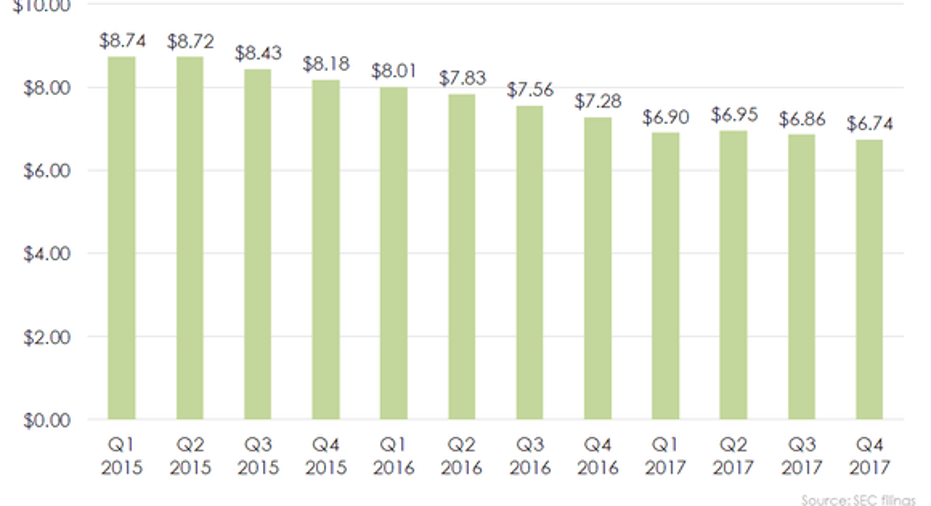Apollo Investment: Investment Losses Weigh on Earnings -- Again

Apollo Investment (NASDAQ: AINV) reported operating earnings of $0.17 per share in its fiscal fourth quarter. Including capital gains and losses, the company reported net income of $0.04 per share, weighed down by capital losses from its portfolio investments.
Apollo Investment's quarter by the numbers
Investors measure the earnings power of business-development companies(BDCs) like Apollo Investment in two ways. The first is net investment income, which is a BDC's interest, dividend, and fee income minus operating costs like management and interest expenses.
The second measure of earnings is net income, which adds capital gains or losses to net investment income to arrive at bottom-line earnings.
Over shorter periods of time, net investment income is used as a proxy for a BDC's dividend-paying potential. In the long run, however, a BDC cannot sustainably pay out more than it generates in net income, otherwise it will slowly drain its portfolio by paying dividends in excess of its earnings.
|
Metric |
Q4 2017 |
Q4 2016 |
Year-Over-Year Change |
|---|---|---|---|
|
Net investment income per share |
$0.17 |
$0.20 |
(15%) |
|
Net capital losses per share |
($0.13) |
($0.30) |
N/A |
|
Net income per share |
$0.04 |
($0.10) |
N/A |
|
Net asset value (book value) per share |
$6.74 |
$7.28 |
(7%) |
Data source: Apollo Investment.
Image source: Getty Images.
What happened this quarter?
Here are the three most important things shareholders should know now:
- Apollo Investment reported that its net investment activity was negative this quarter, as repayments and sales of investments exceeded new investments by $195.4 million. Management indicated that it put more money to work after the end of the quarter, bringing its leverage up to its target range of 0.6-0.7 times its equity. The company ended the quarter with net leverage of 0.55 times its equity, low by industry standards.
- Oil and gas investments dropped to 6.6% of its portfolio, while investments in renewable energy fell to 7.7% of the portfolio at quarter end. Energy and related investments have been a sore spot for Apollo Investment, generating the bulk of its investment losses in recent years. As part of an ongoing transition, the company is rotating into lower-risk corporate loans instead of investing with a singular focus on higher yields, a strategy it outlined last quarter.
- The company's external manager agreed to extend fee waivers for another year. For perspective, these fee waivers amounted to about $0.10 in savings per share during the 2017 fiscal year, which flows directly to the bottom line. Shareholders should appreciate that management is taking responsibility for investment performance, and effectively papering over weak investment performance by waiving fees it charges to manage the company.
Data source: SEC filings. Chart by author.
What management had to say
Management noted that the company's smaller discount to book value and available investment opportunities made share repurchases less attractive than in prior periods. When its shares were trading at wider discounts to book value, Apollo Investment was more aggressive than other BDCs in buying back its stock, a shareholder-friendly move.
At a recent price of $6.30 per share, the company trades at less than a 7% discount to book. BDC valuations have broadly improved in recent months thanks to an almost relentless bull run in the value of senior loans.
Looking forward
In the press release, CEO James Zelter said, "Looking ahead to fiscal year 2018, we believe that we are well positioned for when opportunities become more attractive given our substantial investment capacity. We will continue to focus on deploying capital into opportunities sourced from the Apollo / MidCap direct origination platform."
Ultimately, the most important question for Apollo Investment is whether or not it can put an end to the energy-related losses in its portfolio. This quarter, the company wrote down the value of investments in energy companies Venoco and LVI Group to zero, but energy and renewables still make up about 14.3% of the portfolio on a combined basis.
If Apollo Investment can stop the bleeding in energy, its earnings power should start to show with rising, not falling, book value on a per-share basis.
10 stocks we like better than Apollo InvestmentWhen investing geniuses David and Tom Gardner have a stock tip, it can pay to listen. After all, the newsletter they have run for over a decade, Motley Fool Stock Advisor, has tripled the market.*
David and Tom just revealed what they believe are the 10 best stocks for investors to buy right now... and Apollo Investment wasn't one of them! That's right -- they think these 10 stocks are even better buys.
Click here to learn about these picks!
*Stock Advisor returns as of May 1, 2017
Jordan Wathen has no position in any stocks mentioned. The Motley Fool recommends Apollo Investment. The Motley Fool has a disclosure policy.



















